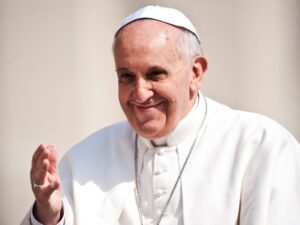Pope’s July visit to Canada focused on Indigenous healing and reconciliation

On May 13, the Holy See Press Office announced that Pope Francis, “having accepted invitations from civil and ecclesiastical authorities, as well as the Indigenous communities,” will travel to Canada from July 24 – 30 and visit the cities of Edmonton, Québec, and Iqaluit.
The announcement came exactly six weeks after the Pope said he felt “sorrow and shame” for the “deplorable conduct” of Catholic Church members who ran the residential schools in Canada and asked for God’s forgiveness: “I want to say to you with all my heart, I am very sorry. And I join my brothers, Canadian bishops, in asking your pardon.”
The Pope issued the apology on April 1 during the closing event of a weeklong series of meetings with First Nations, Inuit, and Métis delegates who shared personal stories about the impact and ongoing legacy of church-run residential schools. The Pope said he had been enriched by the delegate’s words and looked forward to benefiting from them again when he visited “where your families live.” He promised to travel to Canada “in the days” around the Feast of Saint Anne on July 26.
The Indigenous representatives who were part of the delegation in Rome emphasized the importance of having the Pope apologize directly to Survivors and their families on their territories and in their communities.
Following the Pope’s address, Assembly of First Nations delegation lead, Dene Nation national chief, and residential school Survivor Gerald Antoine said: “Today is a day that we’ve been waiting for, and certainly one that will be uplifted in our history. The next step is for the Holy Father to apologize to our family at their home…they also seek the words of apology at home.”
The May 13 announcement about the upcoming visit mentions that Edmonton has the second-largest urban Indigenous population in Canada and that 25 residential schools were in Alberta, the most of any Canadian province or territory. Regarding Iqaluit, the statement notes that it has the highest per capita population of Inuit (3,900) of any Canadian city with more than 5,000 people. Qubec City is home to Ste. Anne-de-Beaupré, one of the oldest and most popular pilgrimage sites in North America.
In a separate statement on the same day as the Vatican announcement, the President of the Canadian Conference of Catholic Bishops (CCCB), Bishop Raymond Poisson, said “We are immensely grateful that the Holy Father has accepted our invitation to continue the journey of healing and reconciliation with Indigenous Peoples of this land.”
Archbishop Richard Smith, the Archbishop of Edmonton, has been appointed General Coordinator for the Papal Visit. The archbishop was part of the delegation to Rome in March.
According to the CCCB, “specific sites and a formal program will be developed in dialogue with Indigenous partners at the local and national level. Given the focus on Indigenous healing and reconciliation, the Holy Father is expected to visit the site of a former residential school.”
A full program with details about events, activities, and how people can participate is expected soon.
More information is also available at papalvisit.ca, which includes answers to “11 Questions About the Papal Visit.” Question number 1 asks when and why Pope Francis is coming to Canada and part of the answer is that it “will provide a unique opportunity for him, once again, to listen and dialogue with Indigenous Peoples, to express his heartfelt closeness and to address the impact of colonization and the participation of the Catholic Church in the operation of residential schools throughout Canada.”
The answer to question number 3, which asks: “How will Indigenous Peoples participate in the preparation of the Papal Visit?” is: “Indigenous Peoples have been engaged throughout the planning for the Papal Visit to Canada. These conversations began with delegates preparing to visit the Vatican in March/April 2022 and continued during their private meetings with Pope Francis as well as ongoing dialogue with a working group of Canadian Bishops. Indigenous partners have also been involved in advance visits to possible sites for the Papal Visit. With confirmation of dates and general locations of the visit, the focus, themes, and programming of the visit will also be shaped in dialogue with Indigenous partners.”
In 2015, the Truth and Reconciliation Commission of Canada (TRC: Calls to Action – DocumentCloud) called on the Pope “to issue an apology to Survivors, their families, and communities for the Roman Catholic Church’s role in the spiritual, cultural, emotional, physical, and sexual abuse of First Nations, Inuit, and Métis children in Catholic-run residential schools. We call for that apology to be similar to the 2010 apology issued to Irish victims of abuse and to occur within one year of the issuing of the Report and to be delivered by the Pope in Canada.”
By Ed Bianchi, Manager of Ecumenical and Network Development at KAIROS.
Photo: General Audience with Pope Francis” by Catholic Church (England and Wales) is licensed under CC BY-NC-SA 2.0. To view a copy of this license, visit https://creativecommons.org/licenses/by-nc-sa/2.0/?ref=openverse.
